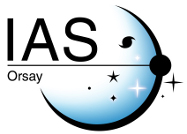Submillimeter observations of the J2142-4423 Ly alpha protocluster at z=2.38
| Title | Submillimeter observations of the J2142-4423 Ly alpha protocluster at z=2.38 |
| Publication Type | Journal Article |
| Year of Publication | 2008 |
| Authors | Beelen, A, Omont, A, Bavouzet, N, Kovacs, A, Lagache, G, De Breuck, C, Weiss, A, Menten, KM, Colbert, JW, Dole, H, Siringo, G, Kreysa, E |
| Journal | Astronomy & Astrophysics |
| Volume | 485 |
| Pagination | 645-655 |
| Date Published | Jul |
| ISBN Number | 0004-6361 |
| Accession Number | WOS:000257144200006 |
| Abstract | Aims. We present observations aimed at exploring both the nature of Ly alpha emitting nebulae ("Ly alpha blobs") at z = 2.38 and the way they trace large scale structure (LSS), by exploring their proximity to "maximum starbursts" through submillimeter emission. Our most important objectives are to make a census of associated submillimeter galaxies (SMGs), check their properties, and look for a possible overdensity in the protocluster J2142-4426 at z = 2.38. Methods. We used the newly commissioned Large APEX Bolometer Camera (LABoCa) on the Atacama Pathfinder EXperiment (APEX) telescope, in its Science Verification phase, to carry out a deep 10' x 10' map at 870 mu m, and we performed multiple checks of the quality of data processing and source extraction. Results. Our map, the first published deep image, confirms the capabilities of APEX/LABoCa as the most efficient current equipment for wide and deep submm mapping. Twenty-two sources were securely extracted with 870 mu m flux densities in the range 3-21 mJy, rms noise similar to 0.8-2.4 mJy, and far-IR luminosities probably in the range similar to 5-20 x 1012 L (circle dot). Only one of the four 50 kpc-extended Ly alpha blobs has a secure 870 mu m counterpart. The 870 mu m source counts in the whole area are marginally higher than in the SHADES SCUBA survey, with a possible over-density around this blob. The majority of the 3.6-24 mu m SEDs of the submillimeter sources indicate they are starburst dominated, with redshifts mostly greater than or similar to 2. However, there is evidence of a high-z AGN in similar to 30% of the sources. |



